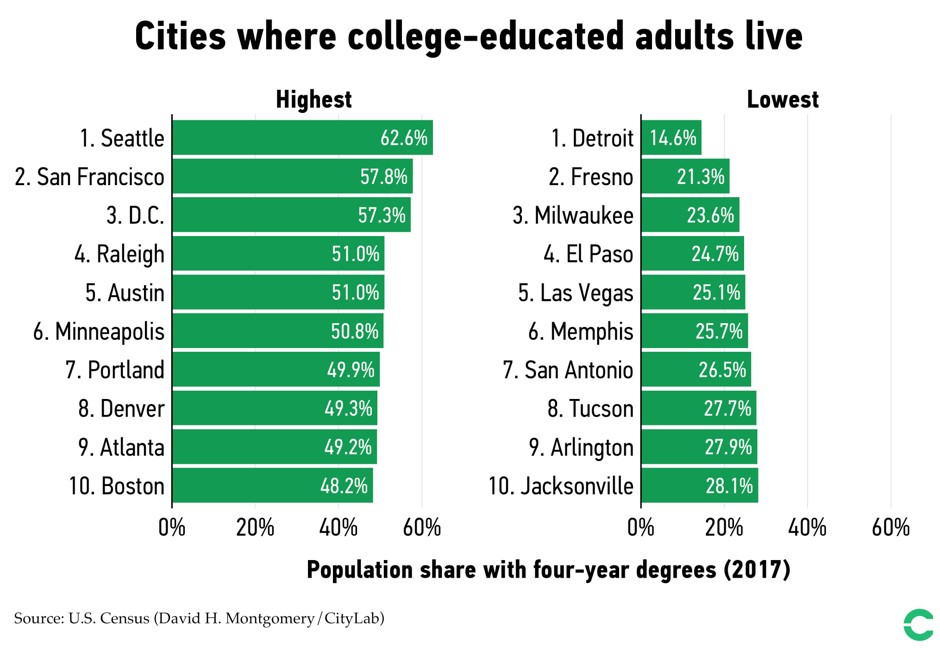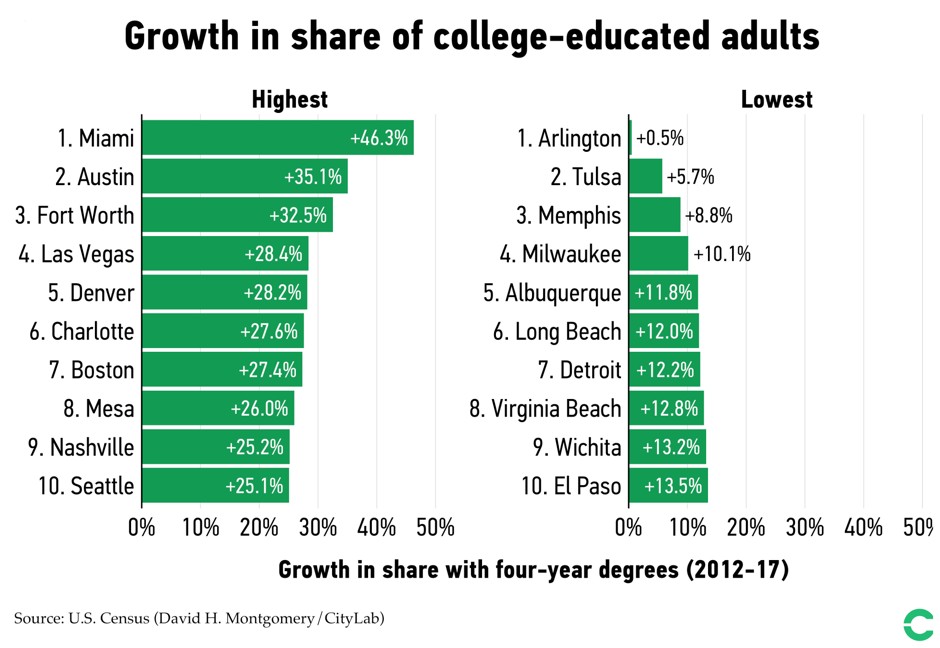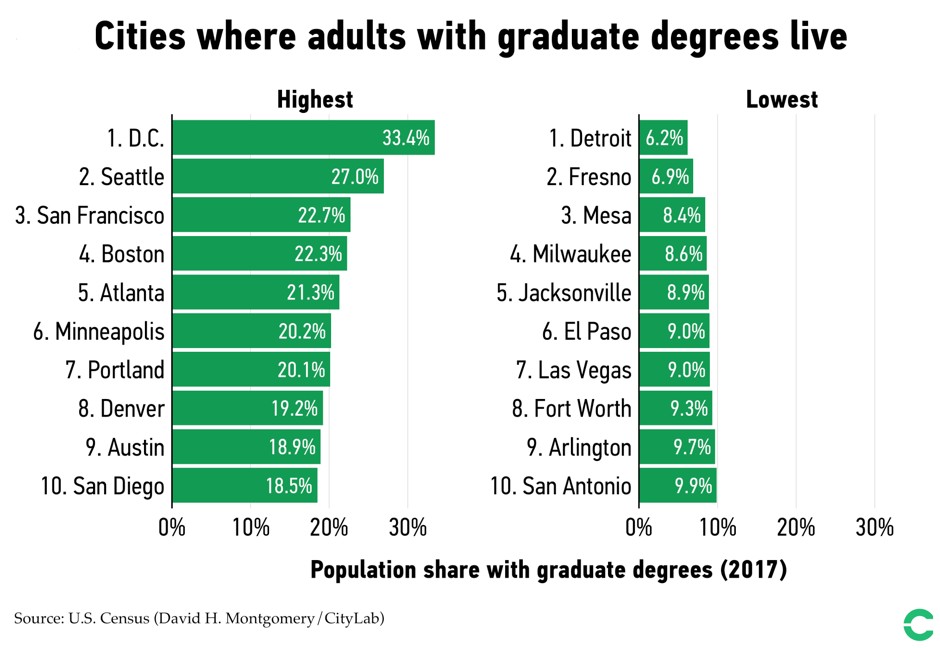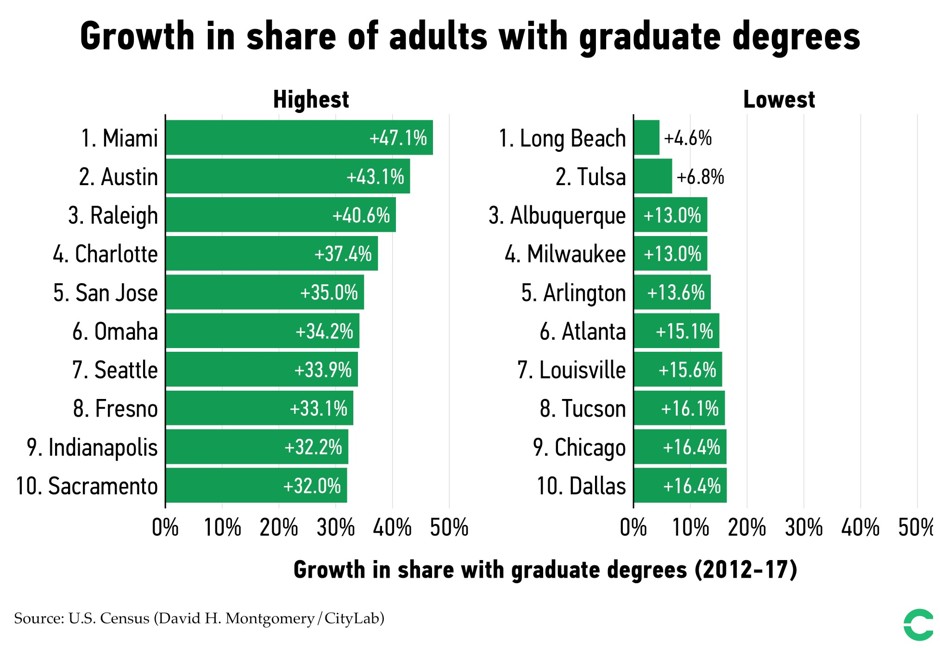Where Do College Grads Live? The Top and Bottom U.S. Cities

Even though superstar hubs top the list of the most educated cities, other cities are growing their share at a much faster rate. Anna Jurkovska/Shutterstock
Even though superstar hubs top the list of the most educated cities, other cities are growing their share at a much faster rate.
Talent, or what economists refer to as human capital, is a key driver of economic growth. A wide body of studies documents the role of education in the economic growth of cities, regions and nations. But, talent has increasingly concentrated in a relatively small number of cities, leading to a growing divergence in talent across places.
To get at this, I worked with a team of researchers to analyze the economic performance of American’s 50 largest core or principal cities over the five-year period of 2012 to 2017. Economist Todd Gabe crunched the numbers, using the U.S. Census’s American Community Survey.
To provide context, we did a rough comparison of these 50 cities to America’s 53 large metros (with more than 1 million people). We excluded two metros, Charlotte and Grand Rapids, Michigan, because they experienced significant boundary changes that would have affected their results; that leaves a comparison group of 51. It is important to note that eight of the 50 largest cities do not belong to any of the 53 large metros, and that not all of these metros have cities that number among the 50 largest. Our city-to-metro comparisons are for illustrative purposes only.
Today, we cover trends in highly educated people—those with college degrees and those with advanced degrees—across America’s 50 largest cities. Karen King, my colleague at the University of Toronto School of Cities, helped analyze the data and make the comparisons, and my CityLab colleague David Montgomery created charts.
College Graduates
The number of college graduates provides the most basic measure of a particular type of talent or human capital. The chart below shows the share of adults with a bachelors’ degree or higher across America’s 50 largest cities and the table below shows the top ten cities with the largest and smallest shares. The leading city has roughly four times the share of the lagging city. In the six top cities, more than half of adults have a bachelor’s degree or higher; in the lowest ranked city just 15 percent do.

The leaders on college grads are a veritable who’s who of leading tech hubs. Seattle tops the list with more than 60 percent of adults having graduated college, with San Francisco; Washington, D.C.; Raleigh; Austin; and Minneapolis rounding out the top six. In the remaining four cities—Portland, Denver, Atlanta, and Boston—nearly half of adults have graduated college.
The list of the cities with the highest share of college grads overlaps considerably with the list of leading metros, with eight places showing up on both. Atlanta ranks ninth of the cities but 15th of metros. San Jose ranks first among metros (with a 43.4 percent share of college grads), but 13th of the 50 largest cities.
The cities with the smallest shares of college grads are a combination of Rust Belt cities, like Detroit, Milwaukee, and Memphis, and less-skilled Sun Belt cities like Las Vegas, Fresno, and El Paso.
There is less overlap between cities and metros with the lowest shares of adults with a bachelor’s degree or high. Just Las Vegas, Memphis, San Antonio and Jacksonville show up on both lists. Detroit is the lowest ranked city but ranked 13th among large metros (with a 31.1 share of college grads). Louisville is the fifth lowest ranked metro (with 28.8 percent college grads) and ranks 15th among cities (with a 29.9 percent share).
The superstar cities of New York and Los Angeles rank much lower down the list, New York ranks 18th with 37.3 percent college grads, and Los Angeles ranks 24th with 34.4 percent. Chicago ranks 17th with 38.8 percent. Interestingly, San Jose in the heart of Silicon Valley ranks outside the top ten; it is 13th with 43.4 percent of adults having graduated college—about the same as Charlotte or Oakland.
The pattern is rather different in the next chart, which tracks the growth in college grads between 2012 and 2017. Now Miami tops the list with nearly 50 percent growth, far outpacing second place Austin, which has 35 percent growth. Fort Worth is next, with 30-plus percent growth. And the remainder of the top ten—Las Vegas, Denver, Charlotte, Boston, Mesa, Nashville, and Seattle—clock in with between 25 and 29 percent growth.

There is considerable difference in the cities that are growing their share of college grads at a fast clip and the metros that are doing so. Rust Belt metros like Pittsburgh, St. Louis, and Cincinnati, as well as Orlando and Tucson—a city with a very low share of college grads—number among the top ten metros for their growth. Miami, which is the large city with the fastest growth rate for college grads, ranks 33rd among large metros with just 9 percent growth of college grads.
The gap between the fastest and slowest growing cities is considerable. The city with the slowest growth in college grads, Arlington, Texas, registered barely any growth at all. Tulsa had just 6 percent growth, and the rest had between 10 and 13 percent growth, less than half that of the top ten cities. Interestingly, Washington, D.C., and New York number among the ten large metros with the slowest growth rate in number of college grads.
Advanced Degrees
Next we turn to a more refined measure of talent, the share of adults who hold graduate or professional degrees. The divergence between the leading and lagging cities is incredible—with the leading city having a concentration of advanced degree holders that is five times greater than that of the lowest ranked city. In the leading cities, roughly 20 to 33 percent of adults hold advanced degrees, while just 6 to 10 percent do in the lowest ranked cities.
Here, the leading cities are again a who’s who of leading tech or knowledge hubs. Washington, D.C. tops the list by a significant margin, followed by Seattle, San Francisco, and Boston. Atlanta, perhaps surprisingly, ranks fifth. Minneapolis, Portland, Denver, Austin, and San Diego round out the top ten. Nine of the top ten cities with the highest shares of graduate degrees are the same as the cities with the highest shares of bachelor’s degrees and above, the lone exception being San Diego, which ranked just outside the top ten at 11th in share of college grads.
The superstar cities of New York and Los Angeles rank further down the list: New York is in 15th place with 15.7 percent of adults holding advanced graduate degrees, and Los Angeles in 33rd with 11.6 percent.
Five places—Washington, D.C., Seattle, San Francisco, Boston, and Denver—overlap both the city and metro list of places with the highest shares of adults with a graduate degree.

The bottom ranked cities are a combination of Rust Belt and Sun Belt cities. Despite images of its resurgence, Detroit takes the bottom spot, with just six percent of its adult population holding an advanced degree. Milwaukee is the other Rust Belt city among the bottom ten, in fourth place. The preponderance of the bottom ten are Sun Belt or Western cities including Fresno, Mesa, Jacksonville and Las Vegas, and four Texas cities—El Paso, Fort Worth, Arlington, and San Antonio. Three places—Las Vegas, Jacksonville and San Antonio—appear on the bottom ten list for both cities and metros.
The pattern is quite a bit different when we look at the change in adults with advanced education. Again, the divergence is incredible, with the leading city growing talent at a ten times faster rate than the most laggard city. The top ten cities have growth rates of between a third and almost half compared to growth rates of 5 to 16 or so percent for bottom ten cities.

Perhaps surprisingly, Miami again tops the list of cities on the growth in adults with graduate degrees, with a whopping five-year growth rate of nearly 50 percent, or ten percent a year. Only it, Austin, and Charlotte appear on both this list and that for growth in adults with a bachelor’s degree and above. The top ten includes tech hubs like Austin, Raleigh, San Jose and Seattle, but also Charlotte, Omaha, Fresno, Indianapolis, and Sacramento.
Four of the top ten cities with the fastest growth in graduate degrees also number among the top ten metros on this score, the tech hubs of Austin, Raleigh, Seattle and San Jose. Miami, which has the fastest growth in adults with graduate degrees, comes in 37th among large metros with just 10.4 percent. Rust Belt metros like Pittsburgh, St. Louis and Memphis along with New Orleans stand alongside tech hubs like San Jose, Austin and Seattle, among the top ten metros with the fastest growth in advanced degrees.
The cities with the slowest growth in advanced degrees are a mixed bag. There are Rust Belt cities like Milwaukee, Chicago, and Louisville, but also Sun Belt and Western cities like Tulsa, Albuquerque, Atlanta, Tucson, Arlington, and Dallas. None of the cities with the slowest growth in advanced degrees overlaps with the list of metros with the slowest growth.
Once again, the superstar cities of New York and Los Angeles rank significantly further down the list. Los Angeles is 31st with 20 percent growth, New York 39th with just under 20 percent growth (lagging even Detroit). A number of leading tech hubs, which rank high up the list in concentration of highly educated talent, also experienced slow growth in graduate degrees. Washington, D.C., clocks in at 21st with 25 percent growth; and San Francisco ranks all the way down at 34th with 20 percent growth.
Our next post looks at yet another measure of talent, examining how the nation’s 50 largest cities stack up on the share of the workforce that is part of the creative class.
CityLab editorial fellow Claire Tran contributed research and editorial assistance to this article.
Richard Florida is a co-founder and editor at large of CityLab and a senior editor at The Atlantic.
NEXT STORY: In Rural Utah, Preventing Suicide Means Meeting Gun Owners Where They Are





